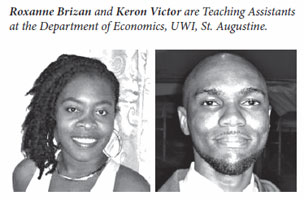|
October 2014

Issue Home >>
|

Good governance is a necessary precondition for development, particularly in determining its pace and character. While anyone can attempt to govern, good governance speaks to the issue of how the act of governing is executed. It encompasses a wide range of social, political and economic activities in which the major characteristics include ensuring participation in decision-making by men and women, consensus-driven processes, promoting accountability and transparency, encouraging responsiveness with respect to serving the nation’s stakeholders, promoting efficiency and effectiveness, providing the opportunity to improve well-being and the protection of human rights, and compliance with the rule of law.
The late Professor Dennis Pantin identified issues of governance as major impediments to a nation’s development. One of his major issues with the current state of governance in the Caribbean region is its close resemblance to the colonial system that it replaced. Sir Arthur Lewis’ solution to the Moyne Commission for this “problem” included a proposal for self-rule which was intended to address the neglect of the colonists and to facilitate growth in the economies. However, many of the region’s constitutions, which were inherited from colonisers, left Caribbean economies stalled and suffering. Existing governing principles had left power in the hands of a few, who seek to maintain this control over a long time.
As one of the founders of the Constitution Reform Forum (CRF), Professor Pantin was particularly passionate about issues of “people power and constitution reform” in the governance dialogue. Popular participation was central to this, in the right to call a referendum on issues of national importance and to recall representatives for breach of contract. Constitutions, Pantin indicated, were not for angels or written to protect to us from angels. Rather, it was written to protect us from devils. Therefore, he noted that the constitution needs to assume the worst about human nature and put in place checks and balances that make it impossible for anyone to be mandated the maximum leader.
This issue of constitution reform is a pertinent cause for reflection given the recent constitutional debate on the Constitution (Amendment) Bill, 2014. In issues of constitution reform, Pantin highlighted the importance of devoting time and resources to the education of the public on issues of constitution reform; this is a key component of good governance. With reference to the conduct of a referendum, Pantin indicated in 2007 that it is necessary that political parties declare their proposed time frame for public dialogue prior to the actual referendum and the identification of persons/institutions to facilitate public discussions. In keeping with good governance and the issue of transparency, he felt that the facilitators of public discussion should comprise persons of civil society organizations whose membership ought to transcend party affiliations.
For some, a sense of misplaced comfort in their socio-economic status renders attention to issues of constitution reform as invalid or divorced from daily activities which promulgate such status. However, it is important to keep the common good in mind and not sacrifice it for such misplaced “comforts,” which sometimes do not reflect the conditions of the masses. Moreso, there is need for a more proactive rather than reactive approach to constitution reform, particularly on contemporary issues.
 While the concept of good governance allows for elected governments and entities to be transparent and accountable, we as a people also have a mandate to hold those elected accountable for their actions. Are our opinions formed by our party affiliations? Are we still divided, as Pantin put it, by “too much prevailing individualism”? According to Pantin, we need structures which facilitate open and frank debate, accountability and transparency, and objection to the exclusion of the people from the process of making or amending the constitution. While the concept of good governance allows for elected governments and entities to be transparent and accountable, we as a people also have a mandate to hold those elected accountable for their actions. Are our opinions formed by our party affiliations? Are we still divided, as Pantin put it, by “too much prevailing individualism”? According to Pantin, we need structures which facilitate open and frank debate, accountability and transparency, and objection to the exclusion of the people from the process of making or amending the constitution.
Professor Dennis Pantin’s ideas will be the focus for discussion at COTE 2014 with the theme “Addressing Contemporary Local and Regional Challenges for Sustainable Development.” This conference is hosted by the Department of Economics, UWI, St. Augustine from October 9-10, 2014 at the Learning Resource Centre (LRC) Auditorium, UWI St Augustine Campus.
|





